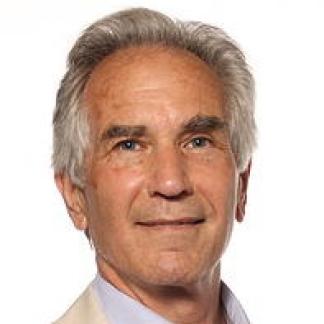Harvey Grill
Lynch 304D
433 S. University Ave.

Affective neuroscience; Animal Learning and Behavior; Sensation and Perception; Neural systems of food intake inhibition
Specific Research Areas
Affective neuroscience - food reward, feeding motivation, food seeking, drug reward, similarity and differences between food and drug reward neurobiology, autonomic and peripheral neural systems of relevance to affective neuroscience
Animal Learning and Behavior – motivation, appetitive and consummatory behavior
Sensation and Perception - taste, gastrointestinal interoception (caloric detection), vagal afferent sensation, skin and central thermosensation/thermoregulation
Clinical translational interests- neural systems of food intake inhibition, neural and endocrine control of energy balance, drug development and treatment for obesity and type 2 diabetes
Neural control of food intake, energy expenditure and body weight, Behavioral (feeding) and systems (energy balance, thermoregulation, autonomic) neuroscience; neural systems of relevance to obesity and anorexia, neural basis of reward, motivation and emotion
Research Synopsis
The dramatic increase in the prevalence of obese (39% of US adults) and overweight (33% of US adults) individuals has intensified interest in understanding the neurobiologic bases of obesity as a disease with significant health consequences and co-morbidities (e.g., type 2 diabetes, cardiovascular disease, cancer). Obesity, like hypertension, diabetes, and bipolar disorder, is a chronic recurring disease that requires chronic treatment. Despite emphasis on caloric restriction [dieting] as a treatment for obesity is ineffective as any achieved weight loss alters physiology in a way that that facilitates weight regain. Obesity surgery while effective has serious side effects. Therefore, the development of effective pharmacotherapies is proving critical as a long-term treatment strategy for obesity. Defining drug targets is guided by findings from basic research on the neurobiology of energy balance. Our lab is focused on defining the signals, neural circuits, neurochemical systems, and intracellular signaling pathways that contribute to the control of food intake, via focusing on alterations in food seeking, feeding motivation, food reward as well as on associative control on feeding and satiation signaling. Unique to our approach is the perspective that the neural control of energy balance is anatomically distributed rather than centered in any one region of the brain. This perspective leads us to examine the neural processing of peripherally generated neural signals (e.g., vagal afferent response to ingested food) and blood-born correlates of energy status signals (e.g., leptin, ghrelin) that act at multiple brain nuclei including but not limited to the caudal brainstem (e.g. NTS, PBN), midbrain (e.g. ventral tegmental area), hypothalamus, thalamus, hippocampus, nucleus accumbens, and prefrontal cortex. Also influencing our work is the idea that the environmental factors drive feeding behavior through associations formed between environmental cues and reward experience, that food palatability is plastic and is affected by reward experience. Our perspective is that many of these factors involve signaling in anatomically distributed nuclei, and each nucleus rather than serving a singular function likely contributes to several functional controls of feeding.
Professor Harvey Grill is no longer accepting new graduate students.
Advisees
Wald HS, Grill HJ. Individual Differences in Behavioral Responses to Palatable Food or to Cholecystokinin Predict Subsequent Diet-Induced Obesity. Obesity 2019 Jun;27(6):943-949.
Mishra D, Richard JE, Maric I, Porteiro B, Häring M, Kooijman S, Musovic S, Eerola K, López-Ferreras L, Peris E, Grycel K, Shevchouk OT, Micallef P, Olofsson CS, Wernstedt Asterholm I, Grill HJ, Nogueiras R, Skibicka KP. Parabrachial Interleukin-6 Reduces Body Weight and Food Intake and Increases Thermogenesis to Regulate Energy Metabolism. Cell Reports. 2019 Mar 12;26(11):3011-3026
Davis XS, Grill HJ. The hindbrain is a site of energy balance action for prolactin-releasing peptide: feeding and thermic effects from GPR10 stimulation of the nucleus tractus solitarius/area postrema. Psychopharmacology (Berl). 2018 Aug;235(8):2287-2301
Ong ZY, Liu, J.J., Pang, Z.P., Grill HJ. Paraventricular thalamus: a novel site of action for glucagon-like peptide-1 receptor signaling on food intake and reward, Neuropsychopharmacology, 2017 Nov;42(12):2387-2397.
Ong ZY, Bongiorno, D.M., Hernando, M.A. Grill HJ. Effects of endogenous oxytocin receptor signaling in nucleus tractus solitarius on satiation-mediated feeding and thermogenic control, Endocrinology, 2017 Sep 1;158(9):2826-2836.
Alhadeff AL, Holland RA, Zheng H, Rinaman L, Grill HJ, De Jonghe BC. Excitatory hindbrain-forebrain communication is required for cisplatin-induced anorexia and weight loss.
J. Neuroscience. 2017 Jan 11;37(2):362-370
Kanoski SE, Grill HJ. Hippocampus Contributions to Food Intake Control: Mnemonic, Neuroanatomical, and Endocrine Mechanisms. Biological Psychiatry. 2017 May 1;81(9):748-756.
Review
Alhadeff, A.L., Grill, H.J. Hindbrain glucagon-like peptide-1 receptor signaling reduces appetitive and motivational aspects of feeding. Am J. Physiology, 2014, Aug 15;307(4):R465-70.
Kanoski, S.E., Fortin, S.M., Ricks, K.M., Grill, H.J. Ghrelin signaling in the ventral hippocampus stimulates learned and motivational aspects of feeding via PI3K-Akt signaling
Biological Psychiatry, 2013 May 1;73(9):915-23.
Grill, H. J., M.R. Hayes. Hindbrain neurons are an essential hub in the neuroanatomically distributed control of energy balance. Cell Metabolism 2012 Sep 5;16(3):296-309. Review
Hayes MR, Leichner TM, Zhao S, Lee GS, Chowansky A, Zimmer D, De Jonghe BC, Kanoski SE, Grill HJ*, Bence KK*. Intracellular signals mediating the food intake-suppressive effects of hindbrain glucagon-like peptide-1 receptor activation. Cell Metabolism 2011 Mar 2;13(3):320-30
Skibicka KP, Alhadeff AL, Leichner TM, Grill HJ. Neural controls of prostaglandin 2 pyrogenic, tachycardic, and anorexic actions are anatomically distributed. Endocrinology. 2011 Jun;152(6):2400-8.
Kanoski SE, Hayes MR, Greenwald HS, Fortin SM, Gianessi CA, Gilbert JR, Grill HJ. Hippocampal leptin signaling reduces food intake and modulates food-related memory processing. Neuropsychopharmocology, 2011, Aug;36(9):1859-70.
Grill. H.J. Leptin and the systems neuroscience of meal size control. Frontiers in Neuroendocrinology, 2010 Jan;31(1):61-78 Review